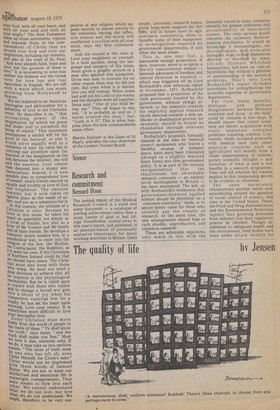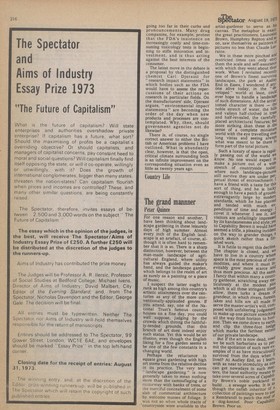Science
Research and commitment
Bernard Dixon
The annual report of the Medical Research Council is a staid and sober document — a catalogue of sterling achievement rather than a noisy carrier of glad or bad tidings. Nonetheless, tucked away in this year's report, just published, is an announcement of potentially explosive importance for many working scientists in Britain. Quite simply, university research teams given long-term support by the MRC will in future have to sign contracts committing them to transfer some of their manpower to investigations required by government departments, if and when the need arises.
This is, one may feel, a reasonable enough proposition. It does, however, serve to re-ignite a fiercely controversial debate — between advocates of freedom and central direction in research — which was triggered off by Lord Rothschild's now infamous report in November, 1971. Rothschild proposed that a proportion of the cash previously handed by the government, without strings attached, to the research councils for explicitly applied research (iTork directed towards a new antibiotic or desalination process, for example) should in future be channelled through relevant government departments.
Rothschild's proposals, furiously resisted at the time by research council spokesmen who feared a harmful erosion of independence, have since been translated (though in a slightly watered down form) into firm government policy. It is as part of the ensuing reorganisation that the requirement for switchable research contracts — an entirely novel development in Britain — has been announced. The aim, as with Rothschild's insistence that government-financed applied science should be promoted on a ' customer-contractor' basis, is to secure better value for those who actually use the results of research. At the same time, the new arrangements should help to curb shoddy, unproductive, and repetitive research.
These are admirable objectives, very much in line with the
demands voiced in many countries recently for greater relevance and accountability of laboratory science. The only serious doubt concerns the necessary decisionmaking machinery. It would be intolerable if immunologists, endocrinologists, and molecular biologists were to find themselves directed or thwarted by scientifically illiterate Whitehall bureaucrats, hell-bent on cost-effectiveness but without a glimmer of understanding of the technical problems. That's why Lord Rothschild's report included provisions for strengthening the scientific expertise in government departments.
Far from being harmful, dialogue and perhaps disagreement between Ministry scientists and those 'in the field ' could be valuable in two ways. It should ensure that career scientists are better acquainted with really important everyday problems requiring solution. Conversely, those occupied primarily with medical care (and other practical concerns such as agriculture) will benefit from a closer understanding of contemporary scientific thought — and therefore of what is and is not feasible in a research programme. Time will tell whether the tension implicit in this relationship proves to be creative or otherwise.
The same uncertainty characterises another battle now smouldering around the question of social control of science, this time in the United States. There, the Food and Drug Administration and the Environmental Protection Agency face growing demands from industry that their regulatory powers be checked. Though established to safeguard health and the environment, both bodies have been under attack recently for going too far in their curbs and pronouncements. Many drug companies, for example, protest that the FDA's insistence on increasingly costly and time-consuming toxicology tests is beginning to stifle innovation and investment, and is thus acting against the best interests of the consumer.
The latest move in the debate is a proposal by the distinguished chemist Carl Djerassi for "research impact statements" in which bodies such as the FDA would have to assess the repercussions of their actions on research in particular fields. On the manufacturers' side, Djerassi argues, "environmental impact' statements " are becoming the order of the day when new products and processes are contemplated. Why, then, should government agencies not do likewise?
There is, of course, no single correct answer to either the British or American problems I have outlined. What is abundantly clear, however, is that the open, critical climate surrounding both is an infinite improvement on the corresponding situation even as little as twenty years ago.

































 Previous page
Previous page